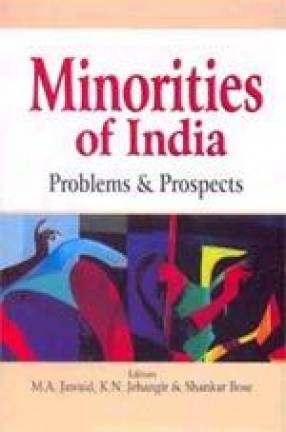The issue of majority-minority has always attracted the attention of both the lay and the knowledgeable since long. Of late, the focus has been more from the perspective of democratic and citizenship rights, human rights, and access to social and economic opportunities. Among the minorities, the status of Muslims, Numerically the largest group, has been dismal in terms of economic status and the level of education including the technical and professional spheres. The book contains the deliberations of a ‘Two-day seminar’ organized by the Indian council of Social Science research, New Delhi on Minorities of India in the 21st century’, which discussed the status of minorities in a multi-dimensional framework to comprehend the problems being faced by them. In particular, it examined the various aspects of the social, economic, administrative issues, and the role of media in relation to the minorities. The papers presented in the seminar have been revised for publication in the book. The book provides a critical evaluation and analysis of the issues facing the minorities especially the Muslims. It will mark a significant advance in the understanding of the complex interplay of social, political, and economic variables to resolve conflicts among the communities within the society. It would undoubtedly be a rich resource of scholarly insights to both the academics and the policy makers alike.
ABOUT THE AUTHOR K.N. Jehangir
Dr. K.N. Jehangir did his B.A. (Hons) in Political Science from Krishnath College, berhampore, Murshidabad (West Bengal), and obtained his post-graduation and Ph.D. degrees from the university of Calcutta. His interest in minorities developed at the Centre for the Study of developing Societies, Delhi (1970-73). He has authored a book entitled 'Muslim Women in West -Bengal: Socio-economic and Political Status' and several articles. His areas of interests are: Gender Studies, Minorities, research and Administration. Currently, he is a Deputy Director in the Indian Council of Social Science Research (ICSSR), New Delhi.
ABOUT THE AUTHOR M.A. Jawaid
Sri M.A. Jawaid was born and brought up in Shahjahanabad (Odl delhi) in an area steeped in art and literary traditions symbolizing the composite culture of India. He did his graduation from Delhi College presently known as zakir Hussain College and Post-graduation in Political science from University of Delhi, and began his career as a freelance writer. He joined the Indian Council of Social science research (ICSSR), New Delhi in 1980. He has been engaged in various academic programmes which include: organizing national and international seminars, conferences, and workshops in India and abroad. His primary areas of interest are communalism, minority affairs, and Muslim politics in India. He is also a member of several educational and cultural bodies.
ABOUT THE AUTHOR Shankar Bose
Shri Shankar Bose after completing his post-graduation joined the center for the study of developing societies (CSDS), Delhi. His specilization in quantitative and empirical analysis of social science data made him well-known scholar among the social scientists. His book data Handbook on Indian Elections became a pioneering work in psephological studies. Analyses in this book became the basis for subsequent exit polls. After working in CSDS for nearly two decades, he joined as a Deputy Director in the Data Achieves programme in the Indian Council of Social Science research (ICSSR), New Delhi in 1987. His interests include: Minorities and gender studies, voting behaviour, and electoral studies.




There are no reviews yet.